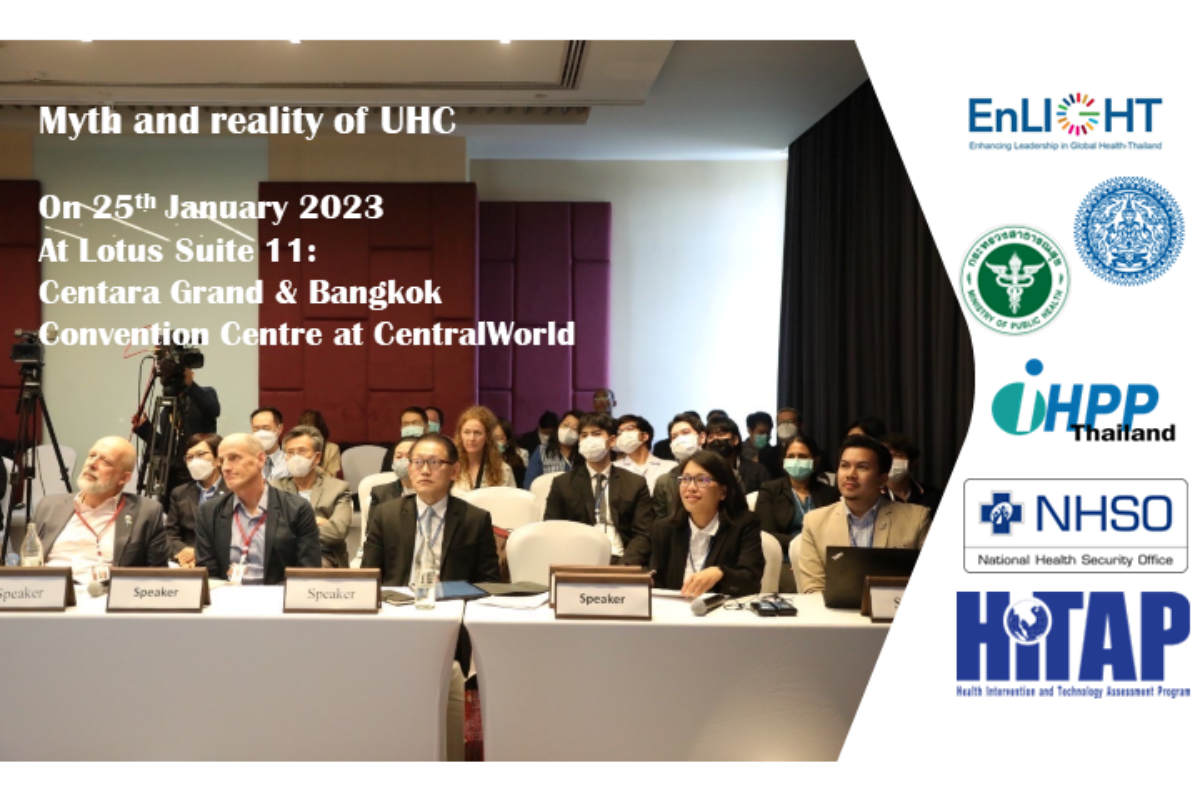Myths and reality of UHC

Myths and reality of UHC on January 25, 2023 at Centara Grand at CentralWorld
Myth and reality of UHC
Experts urge countries not to let the myth prevent them from accelerating efforts toward achieving Universal Health Coverage (UHC).
The myth of UHC was discussed during a side meeting “Myth and Reality of UHC” of the Prince Mahidol Award Conference 2023 at Bangkok’s Centara Grand and Bangkok Convention Center.
Held on 25 January, the side meeting was co-organized by the National Health Security Office (NHSO), International Health Policy Program, Thailand (IHPP), Ministry of Public Health, Global Health Division, Health Intervention and Technology Assessment Program (HITAP), Ministry of Foreign Affairs, and CCS-Enhancing Leadership in Global Health Thailand.
Four myths about UHC were highlighted during the event.
Myth 1: Only rich countries can achieve UHC
“Every country can aim for UHC, not only rich countries,” said Dr Jadej during the meeting.
“Even poor country can provide [access to health services] at low cost if there is political commitment. That is the case for Thailand.”
Dr Jadej said that five factors had made Thailand achieve UHC in 2002, a few years after the Asian financial crisis that hit the Thai economy severely.
The five are political commitment, social movement, effective health finance and payment system, availability of knowledge, and strong health infrastructure — the result of four decades of Thai healthcare investment before the introduction of UHC.
“Moving toward UHC requires strengthening the health system at all levels,” he said. “It does not depend on only money, but also, the spirit of committed health workers, civil society engagement and adequate health system.”
He added that the COVID-19 pandemic could enable many countries to start UHC and see the value of primary healthcare, which is the cornerstone against crisis and future health emergencies.
Myth 2: UHC is only for the poor
Dr Tim Evans, Inaugural Director and Associate Dean of School of Population and Global Health, McGill University’s Faculty of Medicine, said that UHC meant “not-exclusive” and “it’s not only for the poor.”
UHC has been even more important today as the world in the 21st century is challenged by an increasingly informal economy, he emphasized.
Many poor people work in the informal sector without health benefits, forcing them to use private healthcare and pay out of pocket. Many face catastrophic health expenditures and push up into poverty.
Evidence shows that out-of-pocket payments happen in some universal health systems too because of the failure in health finance.
The gap in healthcare access is observed in National Health Service (NHS) in the UK. A study finds people who most needed healthcare in the NHS are less likely to get health services because of resource constraints.
This exclusion is caused by the “unconscious bias” of people who design the health system, said Dr Evans.
He urged everyone to build inclusive health systems that consider the growing informal sector, develop information systems, and train the health workforce to have the power to lead change.
Myth 3: UHC is about providing curative care
Dr Shyama Kuruvilla, Senior Strategic Adviser on World Health Organization (WHO)’s UHC and Life Course unit, said that UHC was not only about providing curative care.
It covers multi-dimensional health and well-being — promotive, preventive, curative, rehabilitative, and palliative essential health services, also, medicines and vaccines.
A paradigm is shifting from curative services toward promoting the health and well-being of the people through their life course, said Dr Kuruvilla.
WHO has supported countries to make this urgent paradigm shift by preventing diseases and addressing their root causes. Around 50% of non-communicable diseases and 65% of the global disease burden can be prevented.
Myth 4: UHC is about saving the last dollar
Dr Toomas Palu from the World Bank Group said that UHC can save the first dollar through health financial protection that prevents people from pushing into poverty.
Any amount spent on health out-of-pocket can be considered a source of financial hardship for the poor. In 2017, 435 million people around the world became further impoverished by out-of-pocket health spending.
“Countries globally are not taking systematic action in financial protection,” said Dr Palu.
“Financial protection is a pillar of UHC that is not making progress. People still spend out-of-pocket for health services, increasing catastrophic health expenditure.”
The nature of out-of-pocket healthcare has changed. It used to be concentrated in curing infections. Now it’s becoming focused more on the continual management of non-communicable diseases — which can be preventive.
Save the first dollar requires investment in primary and preventive care which can remove health barriers and prevent the expensive costs incurred from health complications, said Dr Palu.
He added that the political economy must be addressed as the challenge in building primary and preventive care may happen by a policy that allows resource concentration in powerful hospitals rather than primary care units.
When prevention care is introduced through vertical programs supported by external funders, policymakers may have an impression that it’s a problem of somebody else and they don’t try to integrate it into the health system.
see more information at: https://www.facebook.com/NHSO.Thailand/videos/910723233270336
Related Documents
